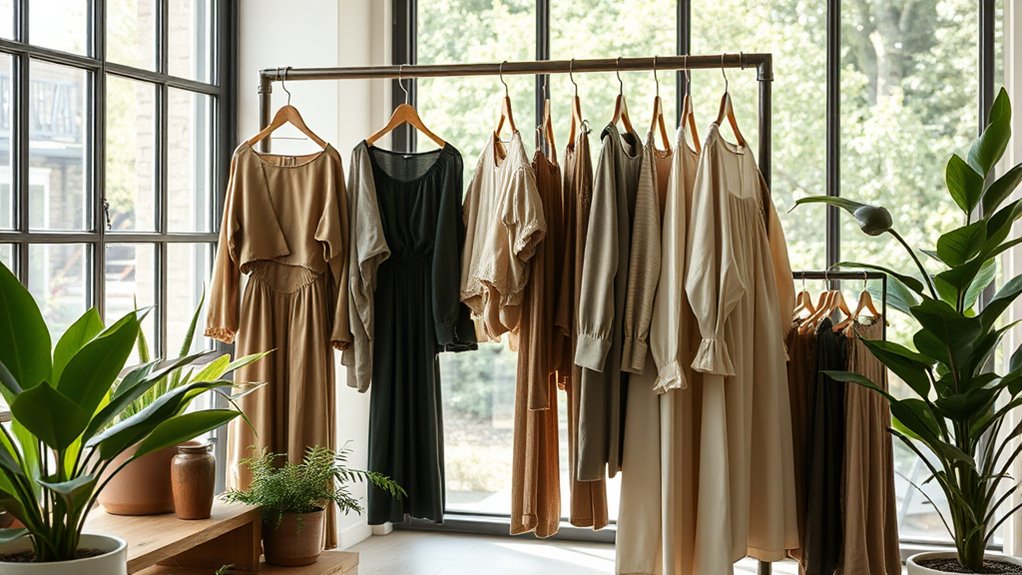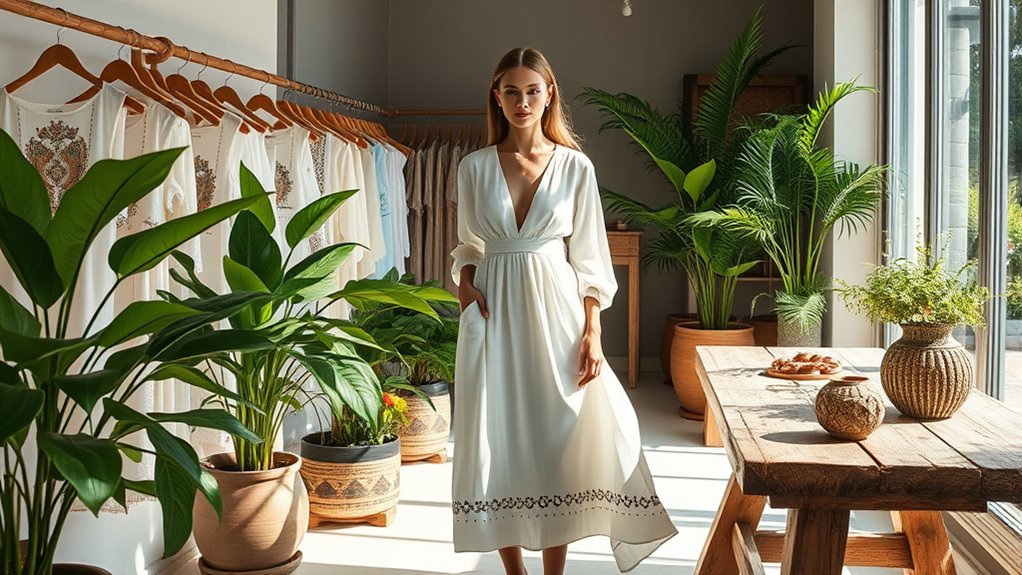Yes, high-end fashion can be ethical and sustainable. Luxury brands are shifting focus from just exclusivity to responsibility by using eco-friendly materials and ensuring ethical sourcing practices. This means your favorite designer pieces now often support fair labor, transparency, and environmental conservation. By choosing brands committed to these values, you can enjoy sophistication and conscience together. Discover how you can make a stylish impact on the future of fashion with responsible choices.
Key Takeaways
- Many luxury brands are now prioritizing ethical sourcing and eco-friendly materials as core elements of their collections.
- Sustainable practices in high-end fashion include using recycled fabrics, organic textiles, and transparent supply chains.
- Ethical luxury combines craftsmanship with responsibility, proving that elegance can coexist with environmental and social consciousness.
- Consumer demand for ethically produced luxury goods is driving brands to adopt more sustainable and transparent operations.
- The industry is shifting toward a future where high-end fashion balances sophistication with sustainability and ethical integrity.

Have you ever wondered if luxury can truly be sustainable? It’s a question that’s gaining importance as more consumers seek products that align with their values. High-end fashion isn’t just about exclusivity and craftsmanship anymore; it’s about responsibility. When you look at luxury brands today, many are making deliberate choices to incorporate ethical sourcing and eco-friendly materials into their collections. This shift isn’t just a trend but a necessary evolution, showing that you don’t have to compromise style for sustainability. Ethical sourcing ensures that the raw materials used in luxury products are obtained in ways that respect human rights, support fair labor practices, and protect local communities. Instead of sourcing exotic skins or rare textiles irresponsibly, brands are now partnering with suppliers who adhere to strict ethical standards. This not only minimizes harm but also promotes transparency, so you can feel confident that your luxury items are made with integrity. Eco-friendly materials further reinforce this commitment. From organic cotton and recycled fabrics to plant-based dyes and biodegradable finishes, these materials reduce environmental impact. When you choose products made from eco-friendly materials, you’re supporting innovations that lessen pollution, conserve water, and lower carbon footprints. Many luxury brands now prioritize using sustainable textiles that are either renewable or recycled, reflecting their dedication to reducing waste. This means your high-end purchase can be both beautiful and environmentally conscious. The integration of ethical sourcing and eco-friendly materials isn’t just a marketing ploy; it’s a fundamental shift in how luxury fashion operates. It’s about making mindful choices at every step—from the farm to the atelier—so you can enjoy your designer piece knowing it was created responsibly. As a consumer, your awareness and demand for sustainable luxury push brands to do better. When you opt for products that prioritize these principles, you actively contribute to a more sustainable industry. It’s about more than just owning a luxurious item; it’s about supporting a movement that values the planet and its people. While traditional luxury often carried a reputation for excess and waste, today’s high-end brands are redefining what it means to be truly luxurious. They’re proving that elegance and sustainability can coexist, and that your choices have power. By embracing brands that focus on ethical sourcing and eco-friendly materials, you’re helping to reshape the future of fashion—one that celebrates beauty, responsibility, and respect for the environment. Additionally, understanding home essentials can help consumers create sustainable living spaces that align with their values.

GarveeHome Gold Bar Carts with 4-Tiers Storage Shelves, Mobile Bar Seving Carts on Wheels with Wine Rack and Glass Holder for Kitchen, Dining Room, Living Room
Sturdy Metal Frame: Bar carts for the home feature an open frame design with a simple and streamlined...
As an affiliate, we earn on qualifying purchases.
Frequently Asked Questions
How Do Luxury Brands Ensure Supply Chain Transparency?
You might wonder how luxury brands ensure supply chain transparency. They often do this by implementing eco-friendly dyes, which reduce environmental impact, and by adopting fair trade sourcing practices to support ethical labor conditions. Brands also conduct regular audits and share their supply chain information with consumers, fostering trust. These steps help high-end fashion companies demonstrate their commitment to transparency, making their supply chains more ethical and environmentally responsible.
What Certifications Indicate Ethical Practices in High-End Fashion?
Imagine uncovering secret signs of ethical practices in high-end fashion. Certifications like Fair Trade and B Corp reveal a brand’s commitment to fair labor and animal welfare, giving you confidence in their integrity. These labels act as guardians of transparency, ensuring your luxury pieces align with ethical standards. When you see them, you know you’re supporting brands that prioritize human rights and animal care, making your fashion choices truly meaningful.
Are Sustainable Materials More Expensive for Designers?
You might wonder if sustainable materials cost more for designers. Yes, the cost implications are often higher due to limited material availability and the need for specialized sourcing. Sustainable options like organic fabrics or recycled fibers can be pricier because they require more effort and resources to produce. However, investing in these materials aligns with ethical practices and supports eco-conscious consumers, making the higher costs a worthwhile trade-off.
How Can Consumers Verify a Brand’S Ethical Claims?
You might stumble upon brands claiming to be ethical, but how do you verify that? It’s all about increasing your consumer awareness and checking for reliable ethical labeling. Look for certifications like Fair Trade or B Corp, and do your research on their sourcing practices. Don’t just trust marketing—dive into transparency reports and reviews. By staying informed, you guarantee your choices support truly ethical brands, making a real impact.
Is Ethical Fashion Truly Scalable for Mass Luxury Markets?
You might wonder if ethical fashion can scale for mass luxury markets. While eco-friendly innovations and fair labor practices are advancing, challenges remain in maintaining quality and exclusivity at larger scales. You can support brands committed to transparency and sustainable practices, but widespread adoption requires significant industry shifts. Though possible, it demands balancing sustainability with the demand for luxury’s craftsmanship and rarity.

GarveeHome Gold Bar Carts with 4-Tiers Storage Shelves,Mobile Bar Seving Carts On Wheels with Wine Rack and Glass Holder for Kitchen, Dining Room, Living Room-Gold+White
Sturdy Metal Frame: Bar carts for the home feature an open frame design with a simple and streamlined...
As an affiliate, we earn on qualifying purchases.
Conclusion
Ultimately, embracing sustainable luxury means you’re planting seeds for a better future, even if the road is rocky. While high-end fashion can’t be perfectly ethical overnight, your choices matter. By supporting brands that prioritize responsibility, you’re steering the ship in the right direction. Remember, Rome wasn’t built in a day, but every small step adds up. Keep pushing for change, because in this game, every little bit helps to turn the tide.

TUTOTAK Bar Cart, Serving Cart for Home, Microwave Cart, Drink Cart, Mobile Kitchen Shelf with Wine Rack and Glass Holder, Rolling Beverage Cart BC01BB030
[Multifunctional Cart] Our bar cart has 4pcs 360° rotating casters, 2 of which are equipped with brakes to...
As an affiliate, we earn on qualifying purchases.

TUTOTAK Bar Cart, Home Bar Serving Cart with 3-Tier Shelf, Drink Cart with Wine Rack, Glass Holder, Rolling bar carts for The Home, Living Room, Brown BC01BB035
[Multifunctional Cart] Our bar cart has 4pcs 360° rotating casters, 2 of which are equipped with brakes to...
As an affiliate, we earn on qualifying purchases.










